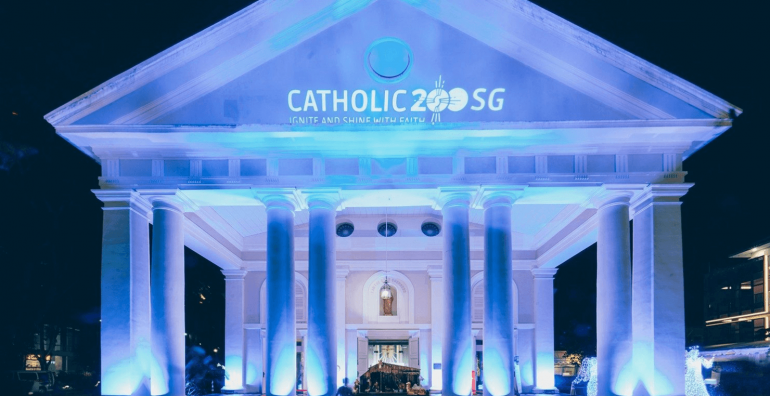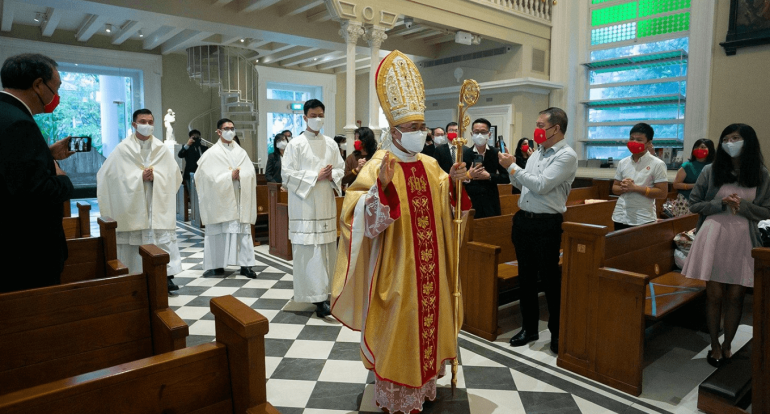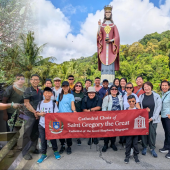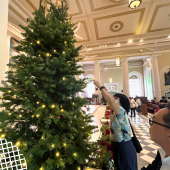Singapore Catholic Church concludes bicentennial celebrations

The Catholic Church in Singapore last week brought to a close its year-long celebrations of 200 years in the city-state. Bells in all 32 Catholic parish churches across the island pealed simultaneously for a minute at 6 pm on Saturday followed by Holy Masses.
All churches took the cue from the main Mass celebrated by Archbishop William Goh of Singapore in the Good Shepherd Cathedral the oldest Catholic Church in the country.
Prime Minister Lee Hsien Loong shared the joy of Singapore’s Catholic community with his presence at the Mass in the cathedral in acknowledgement of the Church’s presence and its contribution to Singapore.
Among others present at the 11 December Mass were Apostolic Nuncio Archbishop Marek Zalewski, the Prime Minister’s wife, Ho Ching, Minister for Culture, Community and Youth Edwin Tong, Minister for Culture and the president of Singapore’s Inter-Religious Organization.
“Ignite and Shine with Faith” was the theme of the year-long bicentennial celebrations, dubbed Catholic200SG, under the Archdiocese of Singapore, the island’s only diocese. The last week, 4-11 December, was marked by a flurry of events and programmes leading up to Saturday’s Masses.
French Saint Laurent Imbert, a member of the Society of Foreign Missions of Paris (MEP) is regarded as the Catholic priest to have celebrated the first Mass in the island-nation, after having landed on Singapore's shores on Dec 11, 1821. He wrote back to Bishop Esprit Marie Joseph Florens, the Apostolic Vicar of Siam who had commissioned him: "I have reached Singapore on 11th instant, and have visited according to your Lordship's request the Catholics of this new settlement. There are only 12 or 13 in number and seem to lead a wretched life." From there, he proceeded to Korea, where he was appointed Vicar Apostolic in 1836. He was martyred there on 21 September 1839 at the age of 43. He is among the 301 martyrs of Korea who were declared saints by Pope John Paul in 1984.
Today, Catholics in Singapore number some 300,000 and have made their presence and contributions felt in the city-state.
“We are called to give thanks for what the Lord is doing through our Church,” Archbishop Goh said in his homily. “In spite of a downward trend in many countries where people are losing faith in God, the recent Census shows that we have grown in strength over the last five years,” he told the faithful, whose number was small in keeping with the Covid-19 protocols.

Archbishop Goh expressed satisfaction that the Catholic200SG celebrations brought Catholics together in creative ways. The online events and videos notched up over 1 million views during the anniversary year. The 4-11 December festival saw 12,000 Catholics attend the various events and activities in the archdiocese, and another over 6,000 attended the concluding final Masses in churches across the 32 parishes.
Prime Minister Lee, a Buddhist by birth, expressed satisfaction he was able to join the Catholic community at Singapore’s cathedral. In a Facebook post he said he came to know from a video about the Catholic Church’s contribution to Singapore over two centuries, through education, healthcare and social welfare. “In our multi-religious society, Catholics thrive and co-exist in harmony with the other religions,” he added.
In terms of the ethnic composition of Singapore’s 3.52 million population, it is 74.3 per cent Chinese, 13.5 per cent Malay, 9 per cent Indian and the rest 3.2 per cent, according to the 2020 census.
Among residents aged 15 years and over, 31.1 per cent identified themselves as Buddhists, 8.8 per cent as Taoists, 18.9 per cent as Christians, 15.6 per cent as Muslims and 5.0 per cent as Hindus. Those with no religious affiliation made up 20.0 per cent.
Singapore’s majority Buddhist Chinese, Malay Muslims, and Indian Hindus have largely avoided conflict since race riots between Chinese and Malays left about 40 dead in the 1960s.
Archbishop Goh pointed out that even though the government is secular, it maintains neutrality and encourages cooperation among religions in the development of the social, moral and spiritual values of the people. “Religions here in Singapore are respectful and supportive of each other,” he said, adding, “We have very strong inter-religious harmony in Singapore, something painstakingly built over many generations.”
The archbishop noted that the Church has grown “internally” over the last eight years, in terms of archdiocesan offices, reinforcement and new movements. Some new ones were added, and some expanded, such as Office of Young People engaging, especially those in colleges, universities and working adults. The Family Commission with 11 affiliates has been reconstituted, and now serves those engaged, married, divorced, and in bereavement.
With the starting of the new Council of Principals in Catholic Schools, the Archdiocesan Commission for Catholic Schools (ACCS) has been very active. The archdiocese has also reinforced its digital media, Catholic Radio and Catholic News. New movements have started such as the Catholic Leadership Centre, Catholic Architectural Guild, Catholic Social Workers Guild and others. “Indeed, our Church is alive! Our lay Catholics are alive! Our organizations are alive. They are filled with the Holy Spirit,” Archbishop Goh said.
Radio Veritas Asia (RVA), a media platform of the Catholic Church, aims to share Christ. RVA started in 1969 as a continental Catholic radio station to serve Asian countries in their respective local language, thus earning the tag “the Voice of Asian Christianity.” Responding to the emerging context, RVA embraced media platforms to connect with the global Asian audience via its 21 language websites and various social media platforms.














